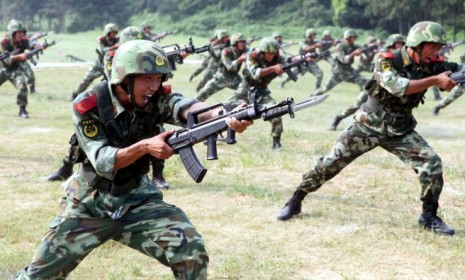China's ballooning military budget: Should America worry?
The world's most populous nation boosts its defense spending, raising concerns that it's building the 'biggest, baddest' army in Asia

A free daily email with the biggest news stories of the day – and the best features from TheWeek.com
You are now subscribed
Your newsletter sign-up was successful
China will increase its military spending by 11 percent in 2012, the latest in a string of yearly double-digit jumps for the emerging superpower. China insists that its growing military might does not pose a threat to anyone, but the expansion does coincide with China's muscle-flexing in a variety of territorial disputes throughout the region and America's renewed interest in East Asia, where President Obama has pledged to bolster American influence. Should the world worry about the expansion of China's army?
Absolutely. China wants to dominate the region: China's "ultimate goals for the Asia-Pacific region are undoubtedly hegemonistic," says The Taipei Times in an editorial. Already, China has used "economic and non-military tactics" to draw Taiwan and others into "its sphere of influence." And with such a "big stick at its disposal, China will soon reach the point where it can take whatever it wants." If we're not careful, China will soon have the "biggest, baddest military machine in the neighborhood," and become "the region's Big Brother."
"Speak softly, but carry a big stick"
The Week
Escape your echo chamber. Get the facts behind the news, plus analysis from multiple perspectives.

Sign up for The Week's Free Newsletters
From our morning news briefing to a weekly Good News Newsletter, get the best of The Week delivered directly to your inbox.
From our morning news briefing to a weekly Good News Newsletter, get the best of The Week delivered directly to your inbox.
But China's army is still dwarfed by America's: Let's put this in perspective, says the United Arab Emirates' The National in an editorial. China's $100 billion defense budget is now the second-largest on Earth, but remains paltry compared to the U.S. America doles out more per year on its army than the next 14 countries combined. China has a lot of catching up to do before we get too worried.
"Bilateral mistrust as China builds military"
Regardless, these superpowers must communicate better: "There is a real clash of interests between the U.S. and China," says Philip Stephens at the U.K.'s Financial Times, and the two sides are bound to butt heads. They must learn to manage their competing goals in a more transparent way, reducing the possibility of a major confrontation. For example, the U.S. and the Soviet Union "established a panoply of institutions, mechanisms, and tripwires to avoid accidental Armageddon." As the U.S. and Chinese navies increasingly bump against each other in the South China Sea, it "would be sensible to replicate such arrangements." At the moment, there is not nearly enough dialogue.
"Danger in Xi's rebuff to Obama"
A free daily email with the biggest news stories of the day – and the best features from TheWeek.com
-
 The 8 best TV shows of the 1960s
The 8 best TV shows of the 1960sThe standout shows of this decade take viewers from outer space to the Wild West
-
 Microdramas are booming
Microdramas are boomingUnder the radar Scroll to watch a whole movie
-
 The Olympic timekeepers keeping the Games on track
The Olympic timekeepers keeping the Games on trackUnder the Radar Swiss watchmaking giant Omega has been at the finish line of every Olympic Games for nearly 100 years